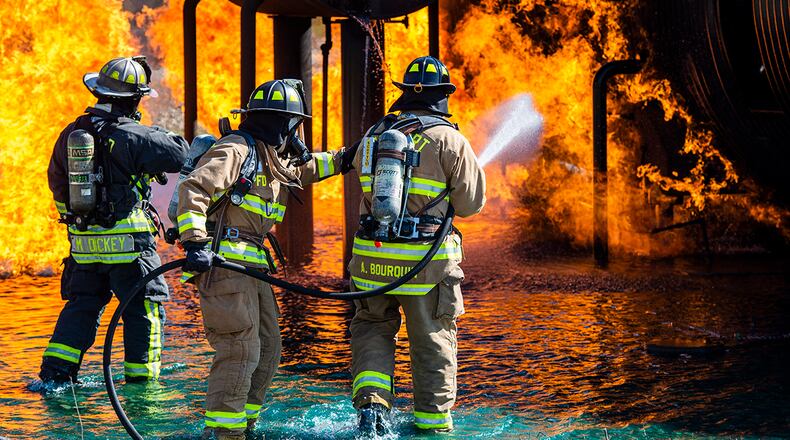“What sets these guys apart is their ability to think outside the box,” said Lt. Col. Jonathan Polston, 788th Civil Engineer Squadron commander. “Some of the different skill sets that they have are not Air Force requirements. They are things that leadership here decided we’re going to take on because not only does it help the base, it helps the community as a whole.”
The Fire Department employs 89 civilian personnel assigned to three fire stations. It provides coverage to the whole installation, including base housing.
In addition to responding to calls on base, the department supports off-base operations through mutual-aid agreements with more than 100 fire departments in the community. The highly trained and skilled firefighters not only fight fires but are also proficient in swift-water rescue, hazardous materials incident response and emergency medical services.
Polston said swift-water rescue is not mandated for the department but the capability to conduct and assist in those missions are critical due to the many rivers and creeks that surround the base. Operations have included rescuing stranded kayakers, retrieving vehicles from the water and diving to recover weapons used in crimes.
Credit: (U.S. Air Force photo by Wesley
Credit: (U.S. Air Force photo by Wesley
Rivers surrounding the base also provide the ideal training ground for learning how to dive in waters with a current. WPFD is able to support Navy dive units with logistics, course presentation and safety assistance in order to complete their swift-current certifications.
“Our fire department brought the class in to train our dive team because we have the river in our response area. The instructor typically teaches classes for the Navy and identified the area as the perfect environment to teach those dive units,” said Jacob King, 788 CES installation fire chief. “And we are able to support them with that.”
The WPAFB Fire Department also created a peer support program to safeguard the mental health of firefighters and other emergency responders. The program pairs responders who may be having a difficult time coping with an incident with a peer who knows what they are going through.
This support is in addition to counseling provided by medical professionals.
“They feel more comfortable going to an ally or peer than somebody else that is outside of their comfort zone or outside the emergency responder family,” King said.
WPFD officials credit their leadership for trusting and encouraging them to seek out opportunities to diversify the department’s skills and capabilities and fulfill objectives, making them an asset to the base and local community.
“One of the greatest ways for us to be able to perform at the level we perform and accomplish many of the goals and requirements is based on the great leadership who support us,” King said. “They believe in us and support our vision and goals.”
Credit: Wesley Farnsworth
Credit: Wesley Farnsworth
About the Author


